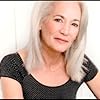Mary L. Tabor
Two key words in this q: “mystery” and “plot.”
First, I never begin with a plot idea—instead always with a vision of a person in trouble. For example, a woman standing in front of her 327 cookbooks and who can no longer cook.
The blank page is the mystery that reveals what it knows about my life without my full understanding. Here is how I’ve explained this as a teacher of invention, of creating without knowing answers to questions like this one.
In a workshop, I try to talk about the story I have in hand written from the heart of a student in terms of the elements of craft that I know I can teach, discuss objectively. But I try to do this with a continuing understanding that we are dealing with art or what we hope will become art. “Art”—what an elusive word. Let me try to make that word concrete with a quote from Lewis Hyde whose book _The Gift: Imagination and the Erotic Life of Property_ I recommend to you if you wish to understand how or why one might spend what’s left of one’s life trying to do this work that rarely if ever sees the light of day and has little or no hope to make one rich. Indeed, great art (Van Gogh’s paintings, Joyce’s _Ulysses_) does not lie easy in the world.
Lewis Hyde says:
“I think, a gift—and particularly an inner gift, a talent—is a mystery. We know what giftedness is for having been gifted, or for having known a gifted man or woman. We know that art is a gift for having had the experience of art. We cannot know these things by way of economic, psychological, or aesthetic theories. Where an inner gift comes from, what obligations of reciprocity it brings with it, how and toward whom our gratitude should be discharged, to what degree we must leave a gift alone and to what degree we must discipline it, how we’re to feel its spirit and preserve its vitality—these and all other questions raised by a gift can only be answered by telling 'Just So' stories. As Whitman says, ‘the talkers talking their talk’ cannot explain these things; we learn by ‘faint clues and indirections.’” —Lewis Hyde, _The Gift: Imagination and the Erotic Life of Property_, p. 280.
First, I never begin with a plot idea—instead always with a vision of a person in trouble. For example, a woman standing in front of her 327 cookbooks and who can no longer cook.
The blank page is the mystery that reveals what it knows about my life without my full understanding. Here is how I’ve explained this as a teacher of invention, of creating without knowing answers to questions like this one.
In a workshop, I try to talk about the story I have in hand written from the heart of a student in terms of the elements of craft that I know I can teach, discuss objectively. But I try to do this with a continuing understanding that we are dealing with art or what we hope will become art. “Art”—what an elusive word. Let me try to make that word concrete with a quote from Lewis Hyde whose book _The Gift: Imagination and the Erotic Life of Property_ I recommend to you if you wish to understand how or why one might spend what’s left of one’s life trying to do this work that rarely if ever sees the light of day and has little or no hope to make one rich. Indeed, great art (Van Gogh’s paintings, Joyce’s _Ulysses_) does not lie easy in the world.
Lewis Hyde says:
“I think, a gift—and particularly an inner gift, a talent—is a mystery. We know what giftedness is for having been gifted, or for having known a gifted man or woman. We know that art is a gift for having had the experience of art. We cannot know these things by way of economic, psychological, or aesthetic theories. Where an inner gift comes from, what obligations of reciprocity it brings with it, how and toward whom our gratitude should be discharged, to what degree we must leave a gift alone and to what degree we must discipline it, how we’re to feel its spirit and preserve its vitality—these and all other questions raised by a gift can only be answered by telling 'Just So' stories. As Whitman says, ‘the talkers talking their talk’ cannot explain these things; we learn by ‘faint clues and indirections.’” —Lewis Hyde, _The Gift: Imagination and the Erotic Life of Property_, p. 280.
More Answered Questions

A Goodreads user
asked
Mary L. Tabor:
Once again, reading your bio, I am so inspired by you, Mary. Just wanted to thank you for...being you! But okay, a question. How do you overcome those times when you are discouraged about your writing? Or ARE you ever discouraged about your writing or the business of writing?
About Goodreads Q&A
Ask and answer questions about books!
You can pose questions to the Goodreads community with Reader Q&A, or ask your favorite author a question with Ask the Author.
See Featured Authors Answering Questions
Learn more


